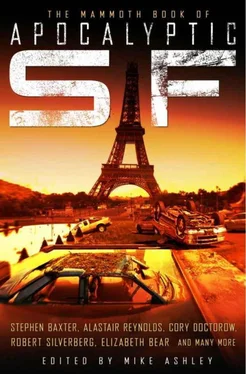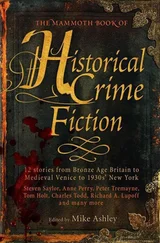Jaal spotted Sura, good-humouredly struggling to get a filthy skin coat off the squirming body of her little sister. Sura, Jaal’s second cousin, was two years older than him. She had a limpid, liquid ease of movement in everything she did.
She saw Jaal looking at her and arched an eyebrow. He blushed, hot, and turned away to the north. The ice was a much less complicated companion than Sura.
He saw something new.
As the angle of the sun continued to change, the light picked out something on the ground. It was a straight line, glowing red in the light of the sun, like an echo of the vast edge of the ice itself. But this line was close, only a short walk from here, cutting through hummocks and scattered boulders. He had to investigate.
With a guilty glance back at his family, he ran away, off to the north, his pigeon-skin boots carrying him silently over the hard ground. The straight-edge feature was further away than it looked, and as he became frustrated he ran faster. But then he came on it. He stumbled to a halt, panting.
It was a ridge as high as his knees — a ridge of stone, but nothing like the ice-carved boulders and shattered gravel that littered the rest of the landscape. Though its top was worn and broken, its sides were flat, smoother than any stone he had touched before, and the sunlight filled its creamy surface with colour.
Gingerly he climbed on the wall to see better. The ridge of stone ran off to left and right, to east and west — and then it turned sharp corners, to run north, before turning back on itself again. There was a pattern here, he saw. This stone ridge traced a straight-edged frame on the ground.
And there were more ridges; the shadows cast by the low sun picked out the stone tracings clearly. The land to the north of here was covered by a tremendous rectangular scribble that went on as far as he could see. All this was made by people. He knew this immediately, without question.
In fact this had been a suburb of Chicago. Most of the city had been scraped clean by the advancing ice but the foundations of this suburb, fortuitously, had been flooded and frozen in before the glaciers came. These ruins were already 100,000 years old.
“Jaal. Jaal!…” His mother’s voice carried to him like the cry of a bird.
He couldn’t bear to leave what he had found. He stood on the eroded wall and let his mother come to him.
She was weary, grimy, stressed. “Why must you do this? Don’t you know the cats hunt in twilight?”
He flinched from the disappointment in her eyes, but he couldn’t contain his excitement. “Look what I found, mother!”
She stared around. Her face showed incomprehension, disinterest. “What is it?”
His imagination leapt, fuelled by wonder, and he tried to make her see what he saw. “Maybe once these rock walls were tall, tall as the ice itself. Maybe people lived here in great heaps, and the smoke of their fires rose up to the sky. Mother, will we come to live here again?”
“Perhaps one day,” his mother said at random, to hush him.
The people would never return. By the time the returning ice had shattered their monocultural, over-extended technological civilization, people had exhausted the Earth of its accessible deposits of iron ore and coal and oil and other resources. People would survive: smart, adaptable, they didn’t need cities for that. But with nothing but their most ancient technologies of stone and fire, they could never again conjure up the towers of Chicago. Soon even Jaal, distracted by the fiery eyes of Sura, would forget this place existed.
But for now he longed to explore. “Let me go on. Just a little further!”
“No,” his mother said gently. “The adventure’s over. It’s time to go. Come now.” And she put her arm around his shoulders, and led him home.
Urlu crawled towards the river. The baked ground was hard under her knees and hands, and stumps of burned-out trees and shrubs scraped her flesh. There was no green here, nothing grew, and nothing moved save a few flecks of ash disturbed by the low breeze. She was naked, sweating, her skin streaked by charcoal. Her hair was a mat, heavy with dust and grease. In one hand she carried a sharpened stone. She was eleven years old. She wore a string of pierced teeth around her neck. The necklace was a gift from her grandfather, Pala, who said the teeth were from an animal called a rabbit. Urlu had never seen a rabbit. The last of them had died in the Burning, before she was born, along with the rats and the raccoons, all the small mammals that had long ago survived the ice with mankind. So there would be no more rabbit teeth. The necklace was precious.
The light brightened. Suddenly there was a shadow beneath her, her own form cast upon the darkened ground. She threw herself flat in the dirt. She wasn’t used to shadows. Cautiously she glanced over her shoulder, up at the sky.
All her life a thick lid of ash-laden cloud had masked the sky. But for the last few days it had been breaking up, and today the cloud had disintegrated further. And now, through high drifting cloud, she saw a disc, pale and gaunt.
It was the sun. She had been told its name, but had never quite believed in it. Now it was revealed, and Urlu helplessly stared up at its geometric purity.
She heard a soft voice call warningly. “Urlu!” It was her mother.
It was no good to be daydreaming about the sky. She had a duty to fulfil, down here in the dirt. She turned and crawled on.
She reached the bank. The river, thick with blackened dirt and heavy with debris, rolled sluggishly. It was so wide that in the dim light of noon she could barely see the far side. In fact this was the Seine, and the charred ground covered traces of what had once been Paris. It made no difference where she was. The whole Earth was like this, all the same.
To Urlu’s right, downstream, she saw hunters, pink faces smeared with dirt peering from the ruined vegetation. The weight of their expectation pressed heavily on her.
She took her bit of chipped stone, and pressed its sharpest edge against the skin of her palm. It had to be her. The people believed that the creatures of the water were attracted by the blood of a virgin. She was afraid of the pain to come, but she had no choice; if she didn’t go through with the cut one of the men would come and do it for her, and that would hurt far more.
But she heard a wail, a cry of loss and sorrow, rising like smoke into the dismal air. It was coming from the camp. The faces along the bank turned, distracted. Then, one by one, the hunters slid back into the ruined undergrowth.
Urlu, hugely relieved, turned away from the debris-choked river, her stone tucked safely in her hand.
The camp was just a clearing in the scorched ground-cover, with a charcoal fire burning listlessly in the hearth. Beside the fire an old man lay on a rough pallet of earth and scorched brush, gaunt, as naked and filthy as the rest. His eyes were wide, rheumy, and he stared at the sky. Pala, forty-five years old, was Urlu’s grandfather. He was dying, eaten from within by something inside his belly.
He was tended by a woman who knelt in the dirt beside him. She was his oldest daughter, Urlu’s aunt. The grime on her face was streaked by tears. “He’s frightened,” said the aunt. “It’s finishing him off.”
Urlu’s mother asked, “Frightened of what?”
The aunt pointed into the sky.
The old man had reason to be frightened of strange lights in the sky. He had been just four years old when a greater light had come to Earth.
After Jaal’s time, the ice had returned a dozen times more before retreating for good. After that, people rapidly cleared the land of the legacy of the ice: descendants of cats and rodents and birds, grown large and confident in the temporary absence of humanity. Then people hunted and farmed, built up elaborate networks of trade and culture, and developed exquisite technologies of wood and stone and bone. There was much evolutionary churning in the depths of the sea, out of reach of mankind. But people were barely touched by time, for there was no need for them to change.
Читать дальше












